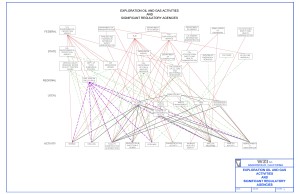In promoting an oil severance tax in California, proponents often cite the fact that other oil producing states have such a tax. However, what is not often acknowledged is who pays that tax. It can be argued, as this article in Bloomberg Business Week does, that the tax in some of those oil severance tax states is ultimately paid in part by California consumers. The same would be true if an oil severance tax is levied here.
To quote from the article: “Alaska charges a “severance” tax on oil extraction that ends up being paid by consumers of petroleum products in other states.” Wyoming does the same. This is a strategy known as “tax exporting,” and is described in the annual State-Local Tax Burden report recently released by the Tax Foundation.
The Bloomberg article says that researchers from the Tax Foundation traced the tax burden to determine who actually pays. The article makes the point by reporting, “if you buy gasoline in San Diego, you’re helping pay Alaska’s taxes even if technically the tax is paid in Alaska.”
If California were to levy an oil severance tax, those taxes likely would not be passed on to consumers in other states. The reason: California needs the energy. In all likelihood, the extracted oil would remain within California’s borders because we still import much of our oil. Levying an oil severance tax will diminish home-grown oil production, hurt the small producers and lead to an increase in oil imports.
On Friday, Congressman Kevin McCarthy, who represents the Kern County area that produces 70-percent of all the state’s oil, told the House Natural Resources Subcommittee on Energy and Mineral Resources, that California needs to pursue hydraulic fracturing in the Monterey Shale deposits to increase state energy production and to promote jobs and the economy. To environmentalist who oppose an increase in this oil production, McCarthy noted that the state’s environmental laws are much safer than the four countries — Saudi Arabia, Ecuador, Columbia, and Iraq — that supply half of California’s oil.
Adding an oil severance tax or delaying fracking just adds to the difficulties California oil companies have in producing energy for the state’s residents.
McCarthy displayed a chart (seen here) to show the regulatory hurdles that have to be crossed to produce energy in the Golden State.
 While California continues to push forward energy alternatives, it cannot ignore relying on traditional energy sources to meet the needs of its citizens. Yet, it seems at every turn another hurdle is thrown up to diminish exploration and/or increase costs.
While California continues to push forward energy alternatives, it cannot ignore relying on traditional energy sources to meet the needs of its citizens. Yet, it seems at every turn another hurdle is thrown up to diminish exploration and/or increase costs.
(By the way, California is ranked fourth among all the states in state-local tax burden as a percentage of personal income in the new Tax Foundation study. However, this ranking was based on the latest figures available for the year 2011, prior to the Golden State raising taxes in 2012. Perhaps a commentary for another time.)

